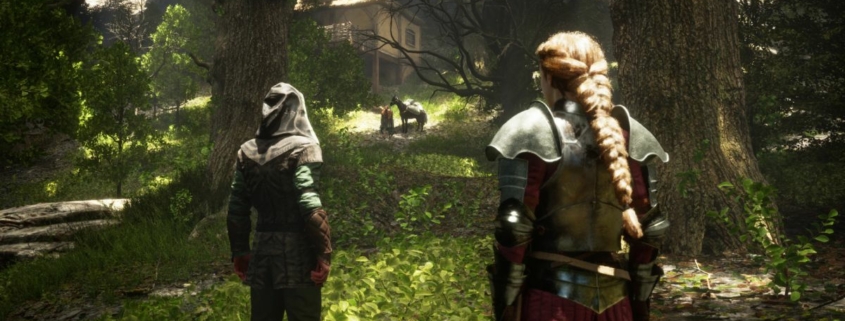Former EVE Online developers announce fantasy sandbox MMO Pax Dei
The sheer amount of possibilities in sandbox MMOs like EVE Online help create the most jaw-dropping stories (opens in new tab) in PC gaming. These worlds of resources and tools and almost no direction are fertile ground for communal stories of all sizes.
A few of the people behind EVE Online, along with former Blizzard, Ubisoft, and Remedy developers, have formed a new studio to make their own sandbox MMO. Mainframe’s first game, Pax Dei, sounds a lot like EVE Online, except it’s down on Earth (or something like it) and set in the Middle Ages.
In Pax Dei, myths, magic, and the supernatural are real. Your character will start with nothing in a zone protected by one of the gods, and as you explore the “procedurally aided” open world and collect resources, you can build a home. Pax Dei encourages players to form communities, or clans, in several ways, like giving you larger plots of land when you place them near others.
“You can play solo to your heart’s content in the game,” lead game designer Pétur Örn Þórarinsson said in an interview with PC Gamer. “But there’s a lot of soft incentives to work with other people.”
“The whole economy is player-run,” Örn Þórarinsson said. You can rely on other players to gather resources and craft items for when you leave the protected zone and start to encounter increasingly harder challenges tied to the game’s story. PvP will be available too, but it will require you to opt into it.
Dungeons and quests will reward unique items, but just like the player-created ones, you can trade them. While it’s definitely possible to go full communist in Pax Dei—much like some groups in EVE Online do—Þórarinsson said there will also be a currency in the game if trading items isn’t enough for you.
Facing danger
In a short, hands-off demo, I saw a mixture of New World and Valheim in Pax Dei. An MMO action bar with weapons and tools sits on the bottom right of the screen and button prompts to gather and examine plants and items flickered in the center. As the third-person camera panned around the character, the hyper-realistic forest and minimal UI made it clear the game runs on Unreal Engine 5. It was difficult to make out a distinct visual identity, but everything I saw came from an unfinished alpha build.
After designating a plot of land, you can start to place walls using gathered items like wood and clay. Over time, you can start to create a village with gardens and workbenches for blacksmiths and alchemy.
Gear works like any other RPG, but much of what you equip had to be created by someone else. You can inspect items to see their stats and equip them before you face off against the game’s mysterious Lovecraftian enemies.
Quests can be found via notes and via researching discarded artifacts. They’ll lead you toward dungeons and buildings protected by tall, inky black monsters that growl and hiss as you slash at them. It was hard to see what kind of combat Pax Dei is going for in the demo. There’s a stamina meter below your health bar that depletes as you attack like it was Dark Souls, but enemies barely seemed to react in this version of the game.
At the end of the demo, the player walked further out into the forest and found a massive winged creature hidden in the foliage. It was like looking at the silhouette of an amygdala clutching the rooftops in Bloodborne: big, lanky, and alien. Mainframe didn’t show me the game’s magic system—which also includes player-created elements—but I imagine you’re going to need something better than a bow to defeat one of those.
Pax Dei is “cloud-native,” and will be playable on “cloud gaming platforms,” after it launches on Steam (opens in new tab). Early reports (opens in new tab) on the game’s development suggested that its mechanics will scale in complexity so there’s always something to do on any device you play it on. Mainframe didn’t elaborate on that aspect of it in my interview though.
Pax Dei doesn’t have an exact release date, but the team plans to start inviting players to test the alpha version of the game soon. You can sign up to test the alpha on the Pax Dei website (opens in new tab).
Source link




